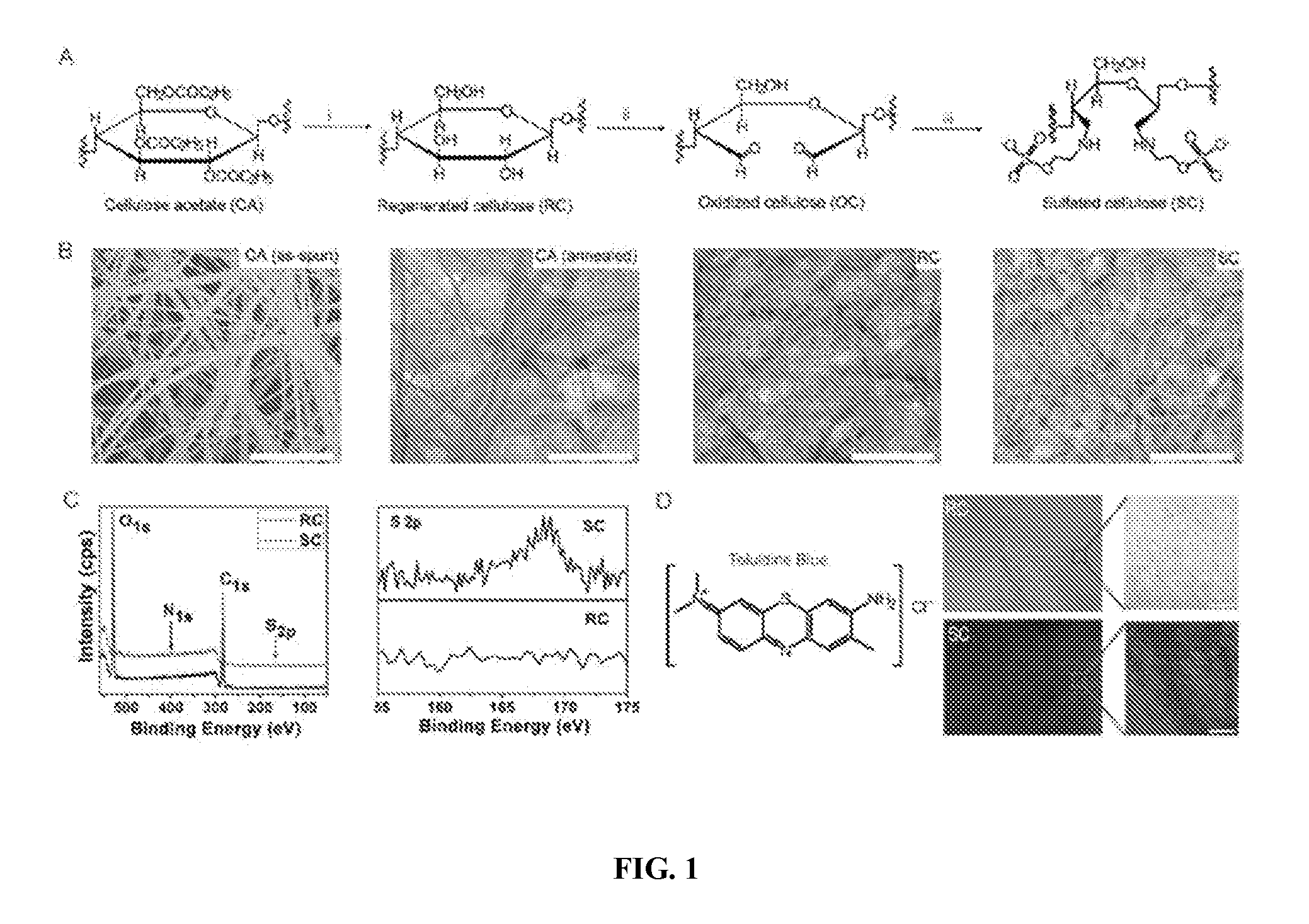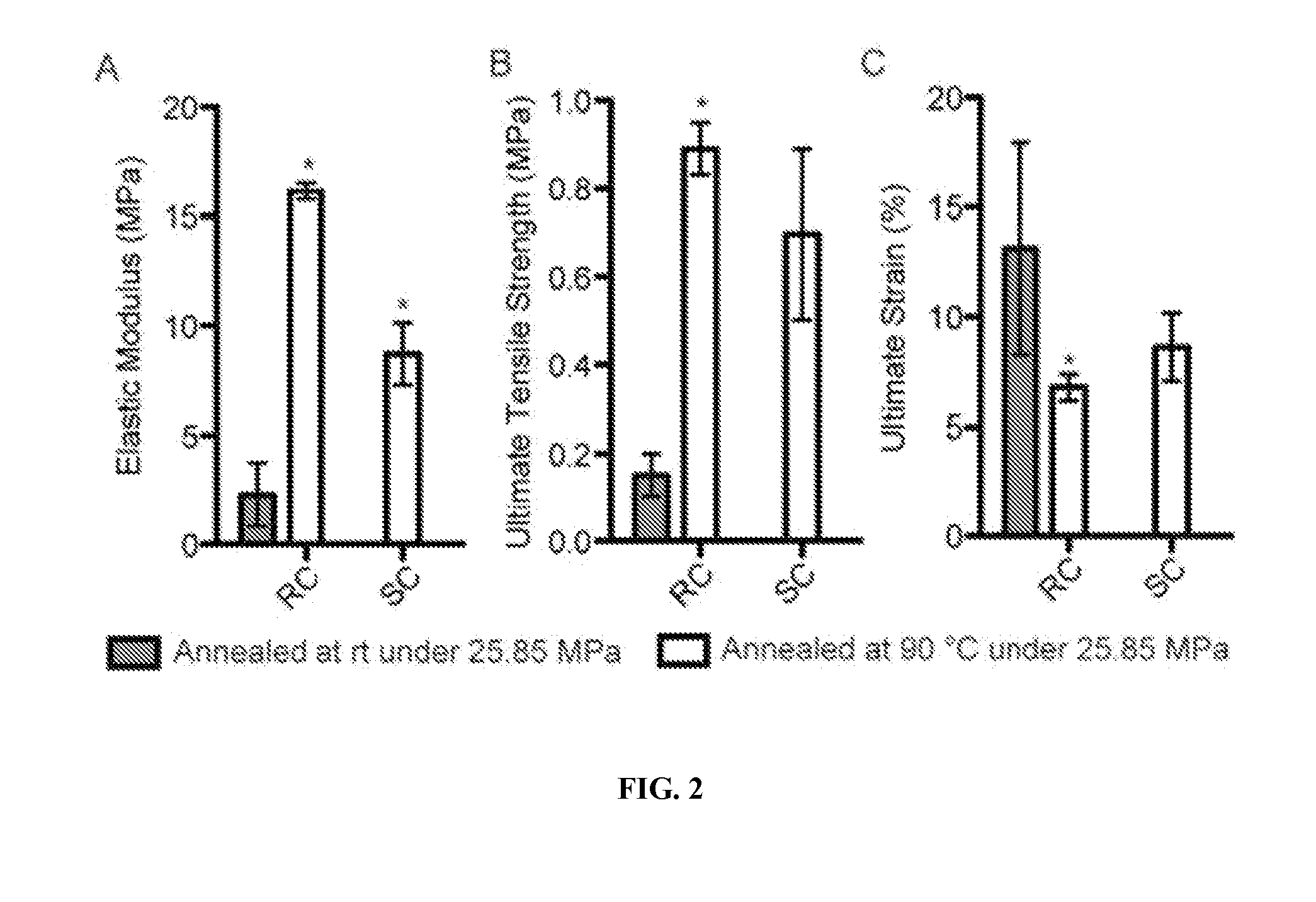Chemically modified cellulose fibrous meshes for use as tissue engineering scaffolds
- Summary
- Abstract
- Description
- Claims
- Application Information
AI Technical Summary
Benefits of technology
Problems solved by technology
Method used
Image
Examples
example 1
[0041]FIG. 1A illustrates an embodiment of the invention, showing the synthetic scheme for chemical modification of thermal-mechanically annealed cellulose acetate (CA) mesh. Since cellulose itself is not soluble in most organic solvents, thus unsuitable for electrospinning, water-stable sulfated polysaccharide fibrous meshes may be prepared from readily accessible electrospun cellulose acetate. CA fibrous mesh was first electrospun by ejecting 2,2,2-trifluoroethanol solution of CA (150 g / L) at a rate of 2.4 mL / h under 15 kV with a distance of 10 cm between the ejection tip and the collection plate. After 4 h of electrospining, CA fibrous meshes 400-650 μm in thickness and with fiber diameters ranging from several hundred nanometers to a few micrometers were obtained (FIG. 1B).
[0042]The electrospun meshes were then thermal-mechanically annealed to sustain sequential chemical modifications and to exhibit adequate tensile modulus for use as a flexible 2-dimensional tissue engineering ...
example 2
[0044]Tensile mechanical testing of the meshes in hydrated state (FIG. 2) show that thermal-mechanical annealing is superior to mechanical compression alone for mesh processing. The RC mesh obtained from thermal-mechanically annealed CA exhibited significantly higher elastic modulus and ultimate tensile strength (˜500% increases, p5% ultimate tensile strains. Overall, these meshes exhibit promising mechanical integrity for flexible manipulations as tissue engineering scaffolds (e.g. wrapping around a 3-dimensional scaffold, press-fitting in an area of defect, or covering an open wound surface with minor stretching).
[0045]The ability of the sulfated fibrous meshes to retain human recombinant bone morphogenetic protein-2 (rhBMP-2) and to support the in vitro attachment and osteogenic differentiation of bone marrow stromal cells (MSCs) for potential bone tissue engineering applications were examined and compared with those of the uncharged cellulose meshes.
example 3
[0046]To examine the ability of RC and SC fibrous meshes to retain / release protein therapeutics, the meshes were absorbed with a single dose of rhBMP-2 (R&D Systems, pI=9.3, 27-ng / cm2) and incubated in PBS at 37° C. for 7 days. The rhBMP-2 released from the meshes over time was quantified by an enzyme-linked immunosorbent assay (ELISA, R&D Systems). As shown in FIG. 3A, both meshes released pre-absorbed rhBMP-2 in a sustained manner over 7 days. The SC mesh exhibited better retention of rhBMP-2 than the RC mesh, with >85% of the protein still retained on the sulfated mesh after 7 days. More importantly, the rhBMP-2 retained on both RC and SC meshes remained biologically active, as evidenced by their ability to induce the osteogenic trans-differentiation of myoblast C2C12 cells in culture. In the absence of rhBMP-2, C2C12 cells cultured on RC and SC meshes did not express osteogenic marker alkaline phosphatase (FIG. 3B, bottom). However, when they were seeded on the BMP-treated meshe...
PUM
| Property | Measurement | Unit |
|---|---|---|
| Time | aaaaa | aaaaa |
| Thickness | aaaaa | aaaaa |
| Thickness | aaaaa | aaaaa |
Abstract
Description
Claims
Application Information
 Login to View More
Login to View More - R&D
- Intellectual Property
- Life Sciences
- Materials
- Tech Scout
- Unparalleled Data Quality
- Higher Quality Content
- 60% Fewer Hallucinations
Browse by: Latest US Patents, China's latest patents, Technical Efficacy Thesaurus, Application Domain, Technology Topic, Popular Technical Reports.
© 2025 PatSnap. All rights reserved.Legal|Privacy policy|Modern Slavery Act Transparency Statement|Sitemap|About US| Contact US: help@patsnap.com



